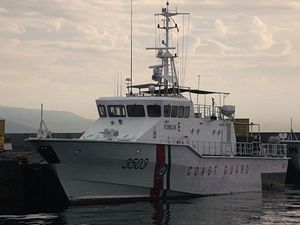One of several agreements concluded during Philippine President Rodrigo Duterte’s closely-watched maiden voyage to China from October 18-21 was a memorandum of understanding on coast guard cooperation (See: “The Limits of Duterte’s US-China Rebalance”). An agreement in that field between the two sides was interesting in part because maritime tensions in the South China Sea had roiled ties during the Benigno Aquino III years before Duterte’s relative downplaying of the issue in Sino-Philippine relations since coming to office in June.
During Duterte’s visit to Beijing, the joint statement – overshadowed by the hype about Duterte’s announced “separation” from the United States –was quite vague on this point, with both sides simply committing to enhancing cooperation between their coast guards and addressing maritime emergency incidents as well as humanitarian and environmental concerns in the South China Sea. As is often the case with such general understandings, their true significance lies not in what is initially agreed, but what is eventually followed through on.
This week, we saw some follow through with respect to the coast guard element of maritime cooperation between the two countries. Though the backdrop was far from ideal given new public revelations about Chinese militarization in the Spratlys this week, the first organizational meeting between the two guards to discuss the formation of a Joint Coast Guard Committee on Maritime Cooperation was held in Manila on December 15 and 16.
The holding of the meeting itself was no doubt significant. As Philippine Coast Guard spokesman Armand Balilo told Agence France-Presse, the “milestone” engagement “opened the communication lines between the two agencies involved in the [South China Sea]”. He added that outstanding South China Sea-related disputes between the two countries were not directly discussed at the meeting.
Substance-wise, according to the joint statement released by both sides, the coast guards “had a friendly exchange of views” on the establishment of the JCGC, getting down to the specifics of the entity including its organizational structure, terms of reference, and operational procedures, as well as potential areas of collaboration such as marine environmental protection, maritime search and rescue, combating maritime crimes including drug trafficking, and, most interestingly, “capacity-building in related areas.” Following these discussions, both sides aim to hold a second organizational meeting as well as the inaugural meeting of the JCGC in February 2017.
Apart from the body itself, both sides also talked about a proposed hotline communication between their coast guards. Few specifics were publicly provided on this point, beyond the fact that a “substantial discussion on an interim agreement” was had. If realized, this would be an important confidence-building step, in spite of the limitations of such hotlines both in terms of crisis management in general as well as what we have seen specifically with respect to China’s behavior in the South China Sea so far (See: “Beware the Illusions of China-ASEAN South China Sea Breakthroughs”).
For now, Philippine officials have been content with expressing standard concerns about recent troubling Chinese behavior in the South China Sea – which Defense Secretary Delfin Lorenzana this week called a “big concern” – while ensuring that bilateral cooperation remains unimpeded. Local Philippine media outlet ABS-CBN quoted Manila’s ambassador to China, Jose Santiago Santa Romana, as saying that “sensitive issues” would be addressed separately “using quiet diplomacy as well as high-level diplomacy.” Philippine Foreign Secretary Perfecto Yasay was blunter when speaking to reporters during Duterte’s trip to Singapore, admitting that “we cannot stop China at this point in time” and urging each country to pursue its own national interests as Manila would continue to do.
The next public engagement where we will be able to evaluate where coast guard collaboration stands will be during the next meeting in February 2017, which the Philippines will host. So far, both sides appear committed to seeing it through. Whether or not they can both seize such new opportunities while also managing existing challenges will have significant effects on the region next year, when the Philippines, until recently the most forward-leaning South China Sea claimant, will chair ASEAN with few signs that China’s incremental maritime assertiveness is going to stop anytime soon.
































